UPSC Daily Current Affairs: 24th December 2024 | Current Affairs & Hindu Analysis: Daily, Weekly & Monthly PDF Download
GS3/Science and Technology
Google DeepMind Unveils GenCast AI Model
Source: The Hindu
 Why in News?
Why in News?Google DeepMind has introduced its groundbreaking GenCast AI model, which aims to enhance the accuracy and advance the timeline of weather predictions compared to existing forecasting systems.
- GenCast is an AI-driven model for weather forecasting.
- It utilizes machine learning to provide more precise long-term weather predictions.
- The model surpasses traditional numerical weather prediction (NWP) methods.
- GenCast has shown superior performance in forecasting extreme weather events.
Additional Details
- What is GenCast? GenCast is an AI-based weather forecasting model developed by Google DeepMind, leveraging machine learning techniques for improved accuracy and longer forecasting capabilities compared to conventional models.
- Data Utilization: Trained on 40 years of reanalysis data (from 1979 to 2019), GenCast integrates historical data with current forecasts to enhance its predictive abilities.
- Neural Network Architecture: The model consists of a neural network with 41,162 nodes and 240,000 edges, where nodes process data and edges connect them to refine predictions.
- Forecast Generation: GenCast employs a diffusion model that improves data accuracy through 30 refinement steps, generating approximately 50 forecasts simultaneously.
- Speed: It produces forecasts in just 8 minutes using a single TPU v5 unit, significantly faster than traditional NWP models that may take several hours.
- Performance Metrics: GenCast outperforms ECMWF ensemble forecasts for 97.2% of targets, particularly excelling in predicting extreme weather conditions.
- Forecasting Range: The model can provide longer-term forecasts for up to 15 days, with a spatial resolution of 0.25° x 0.25° and updates at 12-hour intervals.
- Collaboration: Google collaborates with various weather agencies to improve AI forecasting methodologies while valuing the role of traditional forecasting models.
The introduction of GenCast marks a significant advancement in weather forecasting technology, offering enhanced accuracy and speed that could revolutionize how we prepare for and respond to extreme weather events.
GS2/International Relations
United Nations Internal Justice Council
Source: The Hindu
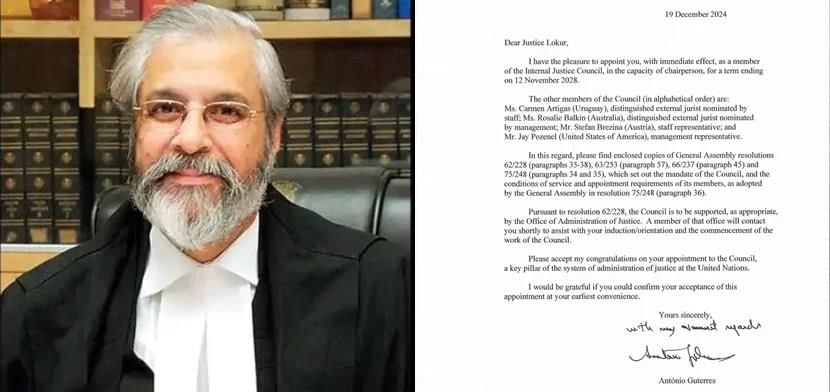 Why in News?
Why in News?Former Supreme Court judge Justice Madan B. Lokur has been appointed as the Chairperson of the United Nations Internal Justice Council (IJC) for a term that will conclude on November 12, 2028. This appointment is significant as it underscores the importance of judicial independence and accountability within the United Nations' internal justice system.
- Justice Madan B. Lokur appointed Chairperson of the IJC.
- The IJC aims to enhance independence and professionalism in the UN's justice system.
Additional Details
- About the United Nations Internal Justice Council (IJC): Established by the UN General Assembly, the IJC is a crucial part of the internal justice system intended to uphold independence, professionalism, and accountability.
- Composition of the IJC:The council consists of five members, including:
- A staff representative
- A management representative
- Two distinguished external jurists (one nominated by staff and one by management)
- Chairperson: A distinguished jurist chosen by consensus among the other members.
- Functions of the IJC:
- To search for suitable candidates for vacancies on the UN Dispute Tribunal (UNDT) and the UN Appeals Tribunal (UNAT).
- To recommend two or three candidates for each vacancy to the General Assembly, ensuring geographical distribution is considered.
- To provide insights on the implementation of the administration of justice system to the General Assembly.
This appointment and the functions of the IJC emphasize the UN's commitment to maintaining a fair and effective internal justice system, promoting accountability and transparency in its operations.
GS3/Economy
National Farmers Day
Source: PIB
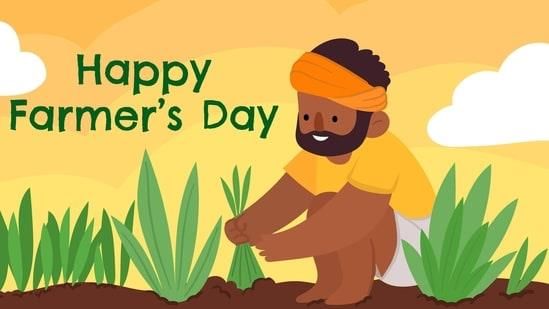 Why in News?
Why in News?National Farmers Day, known as Kisan Diwas, is celebrated annually on December 23 in India. This day was established to honor the contributions of farmers to the nation's economy and to commemorate the birth anniversary of Chaudhary Charan Singh, who served as India’s fifth Prime Minister from 1979 to 1980. Recognized as the "Champion of India’s Farmers," Singh's legacy continues to inspire initiatives aimed at improving the welfare of farmers.
- National Farmers Day is observed on December 23 each year.
- It marks the birth anniversary of Chaudhary Charan Singh.
- The day was first celebrated in 2001 as an initiative by the Government of India.
Additional Details
- Chaudhary Charan Singh: He was an influential political figure and Prime Minister who advocated for farmers' rights and welfare.
- The celebration of National Farmers Day serves to acknowledge the vital role of farmers in sustaining India's economy.
This day not only pays tribute to farmers but also raises awareness about their challenges and contributions, encouraging policies that support agricultural growth and farmer welfare.
GS3/Economy
Critical Minerals: India's Reliance on China
Source: The Hindu
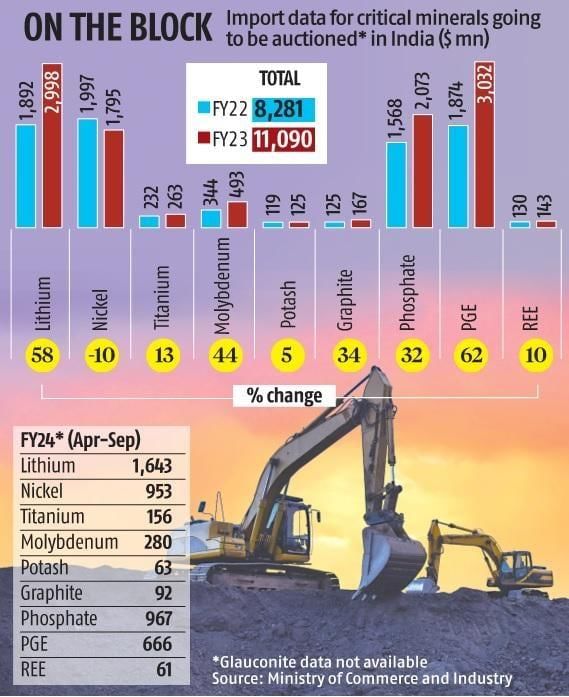 Why in News?
Why in News?The issue of critical minerals is gaining attention due to India's heavy reliance on China for essential resources vital for economic development and national security. This reliance raises concerns about supply chain vulnerabilities and the potential for disruptions in essential supplies.
- Critical minerals are essential for technologies across various sectors, including electronics, telecommunications, and renewable energy.
- India's current dependency on China exceeds 40% for several critical minerals, which poses risks to economic and strategic security.
- The Critical Minerals Summit aims to enhance collaboration and policy dialogue in mineral beneficiation and processing.
Additional Details
- Critical Minerals: These minerals are crucial for the advancement of technologies that support economic growth and national security. They include lithium, graphite, cobalt, titanium, and rare earth elements.
- Current Scenario: The Ministry of Mines in India has identified 30 critical minerals necessary for economic and strategic security. Notably, India relies entirely on imports for 10 of these minerals.
- Dependence on China: India is particularly dependent on China for six critical minerals, including bismuth (85.6%), lithium (82%), silicon (76%), titanium (50.6%), tellurium (48.8%), and graphite (42.4%).
- China's Dominance: China controls a significant portion of global processing, accounting for 87% of rare earth processing, 58% of lithium refining, and 68% of silicon processing.
Given the increasing global emphasis on transitioning to a low carbon emissions economy, the dependency on critical minerals will be a pivotal factor in shaping future economic policies and ensuring sustainable development in India.
GS1/Indian Society
Envisioning India as a Global Skill Supplier
Source: The Hindu
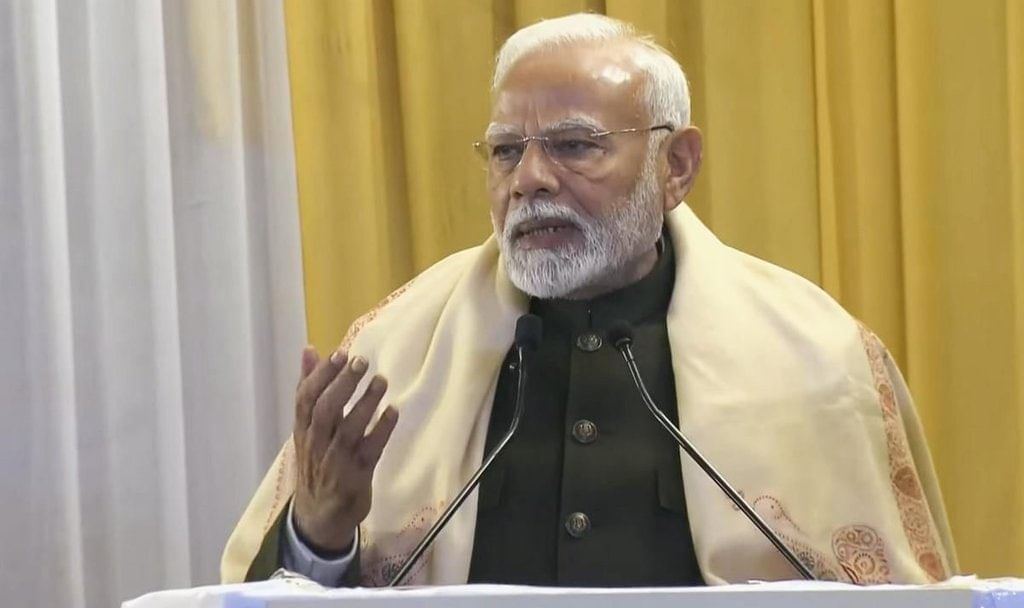 Why in News?
Why in News?In a recent address, the Prime Minister expressed optimism that India's skilled workforce would significantly influence the global job market.
- India boasts a large and youthful workforce, offering a demographic advantage.
- Various government initiatives are in place to enhance skill development.
- Global demand for skilled workers is increasing, particularly in key sectors.
- International agreements facilitate the movement of skilled workers from India.
Additional Details
- Demographic Advantage: India has approximately 554 million individuals aged between 15 and 64 years, providing a substantial workforce to meet global demands for skilled labor.
- Government Initiatives: Programs like the Skill India Programme allocate significant resources for training youth and creating internship opportunities with major companies.
- Growing Global Demand: There is heightened demand for skilled workers in sectors such as IT, healthcare, construction, and logistics, particularly in the Gulf Cooperation Council (GCC), Europe, and North America.
- International Agreements: India has signed bilateral agreements with countries like Japan and France to facilitate the mobility of skilled workers, enhancing its global labor market position.
- Skill Training Programs: The Ministry of Skill Development and Entrepreneurship is committed to aligning training with global standards through vocational training networks, including over 15,000 Industrial Training Institutes (ITIs).
- Curriculum Development: The focus is on integrating globally relevant skills into educational curricula, including initiatives that address the needs of destination countries.
- National Education Policy (NEP) 2020: Emphasizes a holistic educational approach, incorporating critical thinking, creativity, and digital literacy.
- Real-Time Skill Forecasting: Utilization of data analytics to assess job vacancies and skill needs, allowing for a responsive skill development approach aligned with international labor market demands.
- Customized Training Initiatives: Development of short-term training programs tailored for specific countries to better prepare Indian workers for international job markets.
Government Initiatives for Skill Development
- Skill India International Centers (SIIC): Establishes training aligned with international standards and promotes global partnerships to enhance employability abroad.
- Pradhan Mantri Kaushal Vikas Yojana (PMKVY): Offers industry-relevant training with 119 new-age skill courses, certifying over 1.42 crore individuals.
- National Skill Development Mission (NSDM): Provides a unified framework for quality skill development across sectors, aligning with global requirements.
- National Apprenticeship Promotion Scheme (NAPS): Facilitates practical on-the-job training aligned with global industry practices.
- Skill India Digital Hub: A digital platform launched in 2023, offering online resources for vocational training and fostering global skill recognition and accessibility.
- Skill Loan Scheme: Provides financial support for skill training, enabling wider access to high-quality training programs.
Challenges Facing India in Becoming a Global Skill Hub
- Fragmented Policy Structure: The current policy framework for international labor mobility is fragmented, lacking comprehensive strategies based on robust data.
- Inadequate Data on Migration Trends: Limited data sources hinder the creation of effective, evidence-based policies for addressing the needs of Indian workers and foreign employers.
- Underutilization of Return Migrants' Skills: There is often a gap in reintegrating return migrants into the labor market, with skills acquired abroad frequently unrecognized.
- Quality of Skill Development: While initiatives are underway, there is a need to enhance the quality of skill development programs to meet international standards.
Way Forward
- Unified Skill Mobility Policy: Implement a comprehensive, data-driven national framework for international labor migration, focusing on skill forecasting and seamless reintegration of return migrants.
- Global Standards Alignment: Upgrade skill development programs to meet international benchmarks, incorporating customized training for specific destination needs.
The demographic dividend in India can only be realized if the workforce becomes more educated, aware, skilled, and creative. The Indian government is actively working to enhance the capacity of its population to be more productive and employable through various initiatives aimed at skill development and training.
GS2/Governance
Centre Scraps No-Detention Policy for Classes 5 and 8
Source: The Hindu
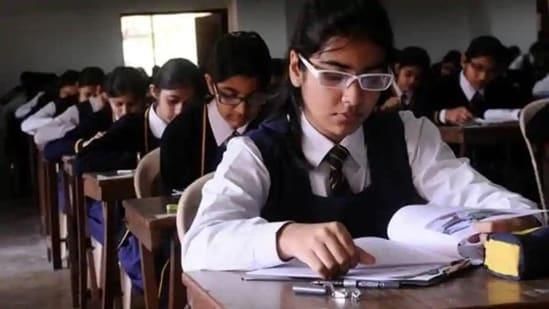 Why in News?
Why in News?The Indian government has recently abolished the no-detention policy for Classes 5 and 8, affecting over 3,000 central schools, including Kendriya Vidyalayas, Jawahar Navodaya Vidyalayas, Sainik Schools, and Eklavya Model Residential Schools under the Ministry of Tribal Affairs. This significant policy change aims to enhance learning outcomes and accountability, while also balancing the rights of students with academic standards.
- The no-detention policy has been scrapped in 18 states and union territories, including Delhi, Rajasthan, and Tamil Nadu.
- States like Haryana and Puducherry are yet to decide on the implementation.
- Some states, such as Andhra Pradesh, Kerala, and Maharashtra, will continue with the no-detention policy.
Additional Details
- Criticism of the Old Policy: Experts have argued that the no-detention policy contributed to a decline in academic standards and student accountability, turning schools into mere mid-day meal providers rather than centers of effective learning.
- Central Advisory Board of Education (CABE): By 2016, a majority of states supported the abolition of the no-detention policy during a CABE meeting.
- National Education Policy (NEP) 2020: The NEP emphasizes enhancing learning outcomes while ensuring educational access for all students.
- New Policy Provisions: Students failing annual exams in Classes 5 or 8 will receive remedial instruction and the opportunity for a re-examination within two months, after which failure may lead to detention.
The abolition of the no-detention policy represents a pivotal change in India's educational framework, striving to balance accountability with inclusivity. While it seeks to improve educational outcomes, its success will significantly depend on the thorough implementation of supportive measures for underperforming students.
GS3/Economy
India’s First Bio-Bitumen National Highway Inaugurated
Source: Times of India
Why in News?
The first bio-bitumen-based stretch of highway was inaugurated on NH-44 in Mansar, Nagpur, Maharashtra, by Union Minister Nitin Gadkari. This initiative marks a significant step towards sustainable road construction in India.
- Bio-bitumen serves as an alternative to traditional bitumen, which is derived from crude oil.
- It is produced from renewable sources, reducing dependence on petroleum.
- The use of bio-bitumen can significantly lower carbon emissions and environmental impact.
Additional Details
- Bio-Bitumen: A bio-based binder created from sustainable resources such as vegetable oils, crop stubble, algae, lignin, and animal manure. This material is essential for reducing the carbon footprint associated with traditional bitumen production.
- The production of bio-bitumen can potentially reduce greenhouse gas emissions by up to 70% compared to fossil-based bitumen.
- India's reliance on imported traditional bitumen can be lessened by utilizing locally available materials for bio-bitumen production.
- The initiative supports the development of bio-refineries, generating revenue and economic benefits for farmers and the bio-refining industry.
- In FY 2023-24, India imported about 50% of its total bitumen requirements, which totaled 3.21 million tonnes.
- India's bitumen consumption has been rising, averaging 7.7 million tonnes annually over the past five years.
- In 2023-24, India constructed approximately 12,300 km of national highways, averaging nearly 34 km per day.
This initiative of using bio-bitumen is a crucial step towards sustainable infrastructure development in India, contributing to environmental conservation and economic growth.
GS3/Science and Technology
Cephalopods: The Intelligent Invertebrates
Source: New York Times
 Why in News?
Why in News?Cephalopods, which encompass species like cuttlefish, squid, and octopuses, are gaining attention for their remarkable cognitive abilities and complex behaviors, sparking discussions on their treatment and conservation.
- Cephalopods are recognized as the most intelligent and mobile of all molluscs.
- This class is the most complex in terms of morphology and behavior within the phylum Mollusca.
- Adaptations for predation, locomotion, and communication define their diverse lifestyles.
- They have a rich evolutionary history of about 500 million years, marked by numerous speciation and extinction events.
Additional Details
- Characteristics:
- Cephalopods possess a completely merged head and foot, surrounded by a ring of arms and/or tentacles.
- They primarily use jet propulsion for locomotion.
- All cephalopods are carnivorous, with some being skilled hunters while others feed on floating debris.
- Nervous System:
- They have well-developed nervous systems and complex sensory organs.
- Cephalopods exhibit highly complex behaviors, including visual camouflage through pigment-rich cells in their skin.
- Communication: The Australian giant cuttlefish (Sepia apama) uses its chromatophores to create patterns for communication, attracting mates and deterring threats.
- Some species exhibit social behaviors, while others prefer solitary lifestyles in the deep ocean or vibrant coral reefs.
- Complicated learning behaviors, such as reversal learning, have been observed in some cephalopods, indicating advanced cognitive abilities.
In summary, cephalopods exemplify a fascinating area of study in animal cognition and behavior, prompting ongoing discussions about their welfare and conservation in the face of environmental changes.
GS3/Economy
CII Seeks Reforms in India’s Priority Sector Lending Framework
Source: MSN
 Why in News?
Why in News?The Confederation of Indian Industry (CII) has proposed significant reforms to India’s Priority Sector Lending (PSL) framework. This initiative aims to broaden the scope of PSL to include emerging sectors and high-impact areas such as digital infrastructure, green initiatives, healthcare, and innovative manufacturing.
- CII suggests forming a high-level committee to review PSL norms.
- The committee may explore the establishment of new Development Finance Institutions (DFIs) for emerging sectors.
Additional Details
- Priority Sector Lending (PSL): A regulatory framework mandated by the Reserve Bank of India (RBI), requiring banks to allocate a portion of their loans to critical sectors like agriculture, education, housing, and small industries.
- Despite its successes, the PSL framework needs regular updates to stay relevant and ensure optimal distribution of financial resources.
- For example, agriculture currently accounts for 14% of India's GDP, yet its PSL allocation remains fixed at 18%, a figure established when agriculture's GDP share was over 30%.
- Sectors such as infrastructure and innovative manufacturing are underrepresented in PSL allocations, despite their potential to enhance economic growth.
The call for reform reflects the necessity of adapting financial policies to the changing economic landscape, ensuring that key sectors receive adequate support to contribute effectively to national development.
GS3/Economy
Looking at 2025: The Economy - Some Positives, Some Concerns
Source: Indian Express
Why in News?
The Finance Minister has characterized the recent slowdown in Q2 growth as a “temporary blip.” However, the Reserve Bank of India (RBI) has revised its GDP growth forecast for 2024-25 downward from 7.2% to 6.6%, raising concerns about the economic outlook.
- The RBI's downgrade reflects fears of a cyclical downturn with Q2 FY25 GDP growth at 5.4%.
- Inflation near double digits complicates monetary policy, potentially leading to prolonged high interest rates.
- India is projected to maintain a growth rate of 6.5%, making it the fastest-growing major economy despite recent challenges.
Additional Details
- Economic Slowdown: The decline in corporate investments, a drop in consumption growth, and reduced urban demand are fundamental challenges affecting the investment climate.
- Inflationary Pressures: Persistent inflation, particularly in food prices, demands careful monetary policy adjustments by the RBI.
- Global Economic Growth Projections:
- India: 6.5%
- China: 4-5%
- United States: 1.5-2%
- Eurozone: ~1%
- Japan: 1-1.5%
- Emerging Markets (excluding China and India): 3-4%
- Risks include sluggish corporate investment, a declining household savings rate, and increasing household debt which could affect economic stability.
- The government is urged to adopt balanced fiscal policies and encourage higher savings and investments to support economic recovery.
In conclusion, addressing these emerging economic challenges will require coordinated efforts between fiscal measures and monetary policy to ensure sustainable growth and stability in the Indian economy.
GS1/Indian Society
Kerala’s Thrissur Pooram
Source: The Hindu
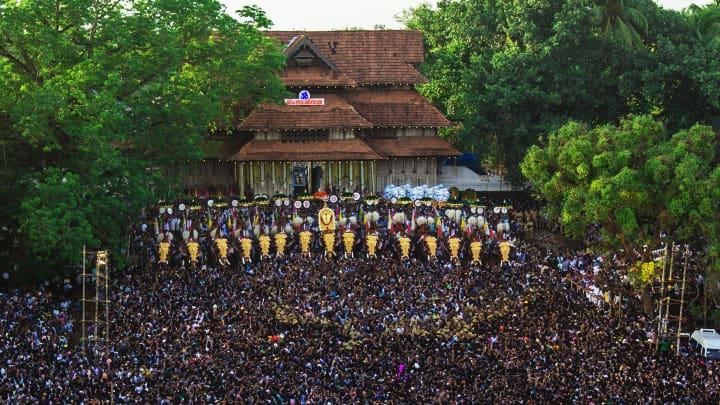 Why in News?
Why in News?The Kerala High Court has issued directives aimed at ensuring the safety and well-being of elephants and artists participating in the Thrissur Pooram festival, a significant cultural event in Kerala.
- Thrissur Pooram is celebrated annually in the Malayalam month of Medam (April-May) at Thekkinkadu Maidanam in Thrissur.
- It is often referred to as the "mother of all Poorams" and is one of the largest temple festivals in Kerala.
- The festival was initiated by Raja Rama Varma, known as Sakthan Thampuran, the Maharaja of Cochin (1790–1805).
Additional Details
- Majestic Elephants: Adorned in traditional attire, these elephants are a central attraction of the festival.
- Traditional Orchestra Music: The festival features vibrant performances by a traditional orchestra known as Panchavadyam.
- Kerala High Court Directives:The court has set guidelines to ensure the safety of elephants and the public during the festival, including:
- Maintaining a minimum distance of 3 metres between elephants, 8 metres between elephants and the public, and a 100 metres buffer zone near fireworks.
- Ensuring elephants have a minimum of three days’ rest between public appearances.
The Thrissur Pooram festival is a vibrant expression of Kerala's cultural heritage, and the recent directives by the Kerala High Court are intended to enhance both safety and the overall experience of this grand celebration.
|
55 videos|5389 docs|1141 tests
|
FAQs on UPSC Daily Current Affairs: 24th December 2024 - Current Affairs & Hindu Analysis: Daily, Weekly & Monthly
| 1. What is the significance of the GenCast AI model unveiled by Google DeepMind? |  |
| 2. What is the role of the United Nations Internal Justice Council? |  |
| 3. Why is National Farmers Day celebrated in India? |  |
| 4. What are the implications of India’s reliance on China for critical minerals? |  |
| 5. What changes have been made regarding the no-detention policy for classes 5 and 8 in India? |  |





















